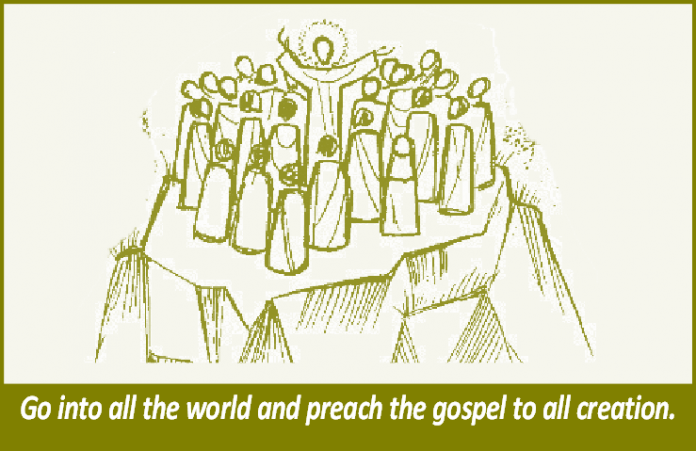16 May 2021
Acts 1.1-11 Ephesians 1.17-23 Mark 16.15-20
A couple were married for over 50 years when the husband died after a short illness. Like many others in such a situation, I wonder how the wife felt; probably terribly alone, abandoned, desolate, maybe orphaned. Perhaps, some of us may have had similar feelings at the loss of a loved one.
Certainly, the apostles and disciples felt the same at the death of Jesus. Did they recall his promise when he had said to them ‘I shall see you again and your hearts will be full of joy’. This is rather unlikely if we read some of the post-resurrection accounts. The Feast of the Ascension is not a commemoration of his departure from this world but of his presence in a new way. The resurrection was not simply a reversal of his death and a return to old times. It was a radical transformation of his presence.
The Ascension meant three things for the Apostles;
1) It was an ending. One stage was over and another had begun. Formerly Jesus was with them physically. Now his presence is that of a firm faith knowing he is still working with them.
2) It was a beginning. They are to take the place of Jesus and continue his work. It is like his handing on the baton to them and to us to continue his work.
3) It gave them the assurance that they had a friend not only on earth but also in heaven. That self-same Jesus who was so marvelously kind, compassionate and forgiving to them is now waiting for them in heaven (and for us too!) To die is not to go out into the dark. It is to go to him.
Thus, the Ascension is not a farewell feast; it does not lament the absence of Jesus. Rather it celebrates the new way Christ became present to his people through the gift of his Spirit. For sure, Christ went away from them. They no longer experience his physical presence on earth. But he is closer to them now than he ever was before, and to us. When Jesus was on earth he was limited like us in space and time. This is no longer true of him. He is, so to speak, out and about. He is present to us in an equally powerful but different manner. We can turn to him in any place, in any situation knowing he is there for us. It is important to realize that the apostles and disciples never regretted the departure of Jesus after his Resurrection and Ascension.
In Acts 1.8 our first reading today we heard: ‘you will be my witnesses …even to the ends of the earth’. So today’s Solemnity, like that of Pentecost are feasts of Christian maturity. They are a call to continue Jesus’ mission in today’s world and the difficulties we face there. The power of the Spirit is with us. Jesus warned his disciples to stay in Jerusalem until they were clothed with power from on high, the promise of the Father. It is as if Jesus were saying to the disciples: ‘please don’t claim to be working on my behalf as my witnesses unless you wait for, receive and live out of the power of the Spirit. If not, you will fail’.
We must face here on earth what God asks us to do and keep our feet firmly on the ground. We must set out to bring his gospel, his Good News to the ends of the earth, no matter how we may be ridiculed or made little of.
Rather than seeing the Ascension just as the departure of Jesus, we should see it as the sending of the Church on mission (in place of Jesus). Rather than seeing the Church as an orphan as a result of the Ascension of Jesus it needs to be seen as being given adult status by God, as being given responsibility to witness to Jesus Christ through the power of his Spirit.
‘Lord Jesus, we believe that you have ascended to be with your Father and that the real meaning of today’s feast is that each of us has been given adult status in your Church to be your witnesses throughout the world. Give us your powerful Holy Spirit to enable us to be effective witnesses of your loving concern for all’. Amen.
Edited from a homily of the late Fr Jim Kirstein, SMA

